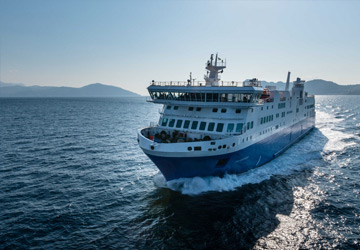
-
Recent Searches
Recent Searches
- Travel Alerts
- My Account
- Customer Service
-
United Kingdom
Oran to Alicante Ferry
The Oran Alicante ferry route connects Algeria with Spain. Currently there is just the 1 ferry company operating this ferry service, Algerie Ferries. The crossing operates up to 4 times each week with sailing durations from around 12 hours.
Oran Alicante sailing durations and frequency may vary from season to season so we’d advise doing a live check to get the most up to date information.
Oran to Alicante Ferry Alternatives
-

-
Get price
-
-

-
Get price
-
-

-
Get price
-
Average Oran Alicante Prices
Prices shown represent the average one way price paid by our customers. The most common booking on the Oran Alicante route is a car and 1 passenger.
Oran Guide
The Algerian city of Oran is located in the north west Mediterranean Sea coast and is Algeria's second largest city. It is a major port, industrial centre and centre of learning in western Algeria and is located around 430 km from Algiers. Founded in 903 by Moorish Andalusian traders, the city has had a long and interesting past. In its time the city has also been ruled by the Spanish, the Turks and since 1831, the French. There is a good selection of hotels in the city to suit most budgets. The city's restaurants tend to offer a good selection of Algerian specialities.
In, or near, the city visitors will find cinemas, arts centres, an open air theatre, a museum, the district of Sidi El Houari, the historic city centre of Oran, the Medina Djedida with its artisanal products, the cathedral and some lovely coastal resorts.
Oran can be reached by ferry from the ports of Marseilles, Sète, Alicante and Almería.
Alicante Guide
Alicante is the capital of the province of Alicante in the southern part of the Valencian community in Spain. Alicante was founded in 324 BC by the Greeks, who named it Akra Leuke (White Peak). In 201 BC it was captured by the Romans who called it Lucentum, and Hannibal is said to have unloaded his famous war elephants here. Between 718 and 1249, the city was ruled by the Moors. In 1265 it was retaken by Alfonso X of Castile and incorporated into the kingdom of Castile. In 1304 it was incorporated into the kingdom of Valencia, in the Aragon Crown. The city was besieged by the French in 1709 and 1812, and later by the Federalists of Cartagena in 1873. In the Spanish Civil War, Alicante was bombed by Italian aircraft, and was one of the last cities to fall to Franco. In Alicante, the Falangist José Antonio Primo de Rivera was executed in November 1936. In 1982 and 1997 heavy rain caused severe flooding and some loss of life.

